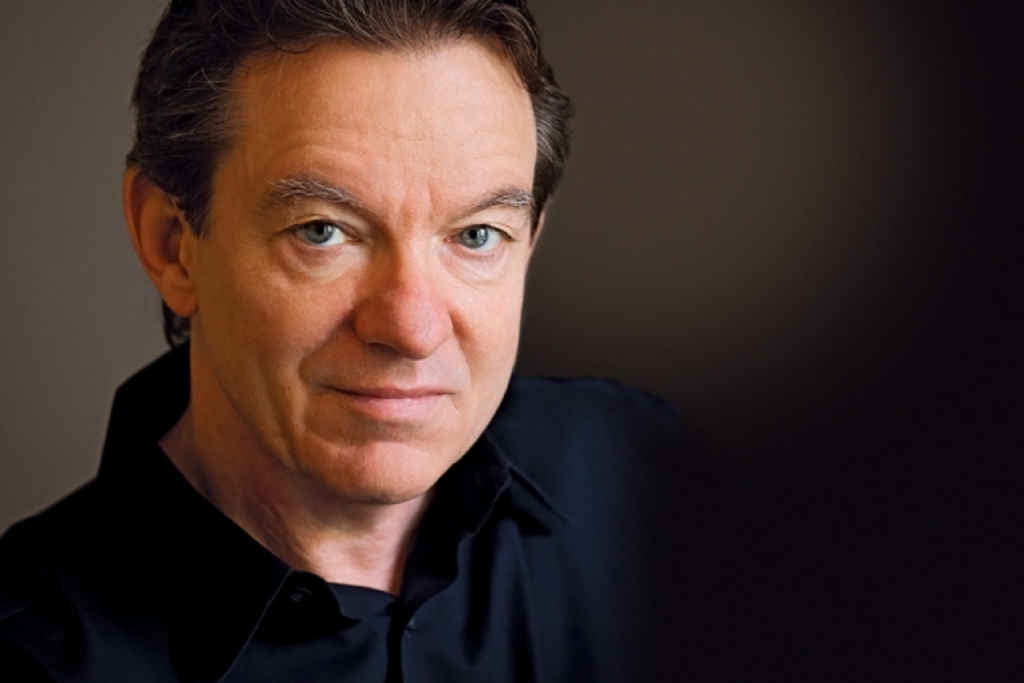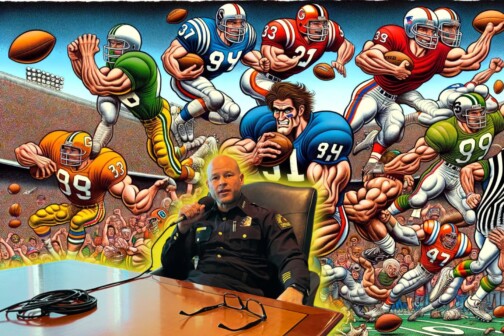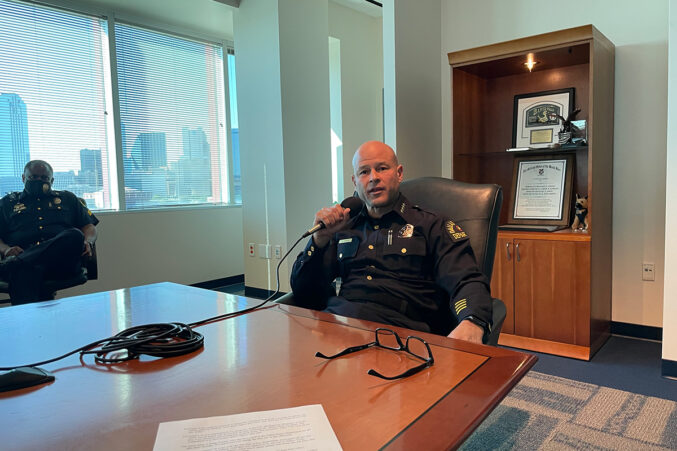Pulitzer Prize-winning author Lawrence Wright is sitting down with former Dallas Morning News columnist Robert Wilonksy this afternoon for a keynote conversation at Downtown Dallas Inc.’s annual meeting. (Ambassador and former Dallas Mayor Ron Kirk will receive the organization’s inaugural Groundbreaker Award at the luncheon, too.)
Wright, who grew up in Dallas and has written about the city and the state for several publications (including this 1988 piece in D Magazine), writes for the New Yorker, and has authored 11 nonfiction books. His most recent efforts include God Save Texas: A Journey into the Soul of the Lone Star State (2018), and The Plague Year: America In The Time Of Covid (2021).
The luncheon is sold out. However, we sat down with Wright Wednesday to talk about Dallas history and Texas politics. An excerpt from our conversation is below, edited for length and clarity.
I think reading your accounts of pre- and post-Kennedy assassination Dallas, plus other books about Dallas, like Jim Schutze’s The Accommodation, informed my view of Dallas history, especially as a reporter coming into Texas from elsewhere. But the longer I’ve worked in this city, the more I realize that a lot has changed, but a lot hasn’t, either. What is your impression of Dallas now versus then?
I’ve been mainly struck by how the assassination changed the culture of the city—and bear in mind, it wasn’t guaranteed that Dallas would grow from that experience. Many cities have had tragedies and didn’t have a transformation.
But before the assassination, Dallas was smug. It was politically on a highway to hell, you know, they had racial problems. It had the largest Methodist and Baptist churches in the world and yet also the highest suicide rate, highest murder rate, and highest divorce rate. There was obviously a measure of hypocrisy in the city that it was really in control, and the assassination just punctured that.
I was asked to make a speech on the 50th anniversary, and I said if Kennedy had to die anywhere I’m glad he died in Dallas because it made it a better city. And I’ve reflected on that since. I went back to Dallas after the police shootings and just saw how nobly the city responded to that—and just a block away from the assassination site. It was a profoundly different city, and I was very impressed. And I’m speaking as one who has been very critical of the city in the past.
It’s interesting that you make that point because, for the past couple of years, we’ve been covering this long progression to craft a racial equity plan. And that plan is now meant to inform all the other city policies, from land use to environmental action, to housing. So it does seem like the city is at least willing to have conversations now that it wouldn’t in the past.
Dallas had a long struggle with race. I graduated from Woodrow Wilson high school in 1965. It was 11 years after Brown vs. the Board of Education, and I never had a Black classmate, and then, when I went to college at Tulane, there was just a handful of Black students. But Dallas, compared to a lot of other cities in the South, had an easier time desegregating because it did it—as it did everything in the city— from the top down. It was Stanley Marcus who desegregated the Zodiac Room, and that’s when the word went out that we were desegregating and that segregation was not good for business.
And I say that, but I still didn’t have a Black classmate in high school. But Dallas did avoid the violence that plagued a lot of other cities in the same situation.
Do you think sometimes the real reason change happens is that it’s no longer politically and/or economically expedient to do it the other way, or is just doing the right thing ever a driver in policy?
In Dallas, the right thing to do and the business thing to do, people conflated those. And, in a way, pragmatically, it didn’t matter. If you did the right thing and it was good for business, well good. But I think Dallas, as you mentioned before, had a redlining problem. And the city was slow to amend it, and there’s a hangover, no doubt, from the historic demography of the city during segregation. And every city in the country has had similar problems. But Dallas could’ve been more aggressive in mending the financial consequences of redlining.
There was obviously a measure of hypocrisy in the city that it was really in control, and the assassination just punctured that.
So shifting gears a little bit, I was reading your most recent piece about Austin, and how it is unrecognizable. But to me, as someone who has lived in the state for a while, and came in during the Perry years, it also seems like Texas in general isn’t recognizable, either.
It’s true. And it’s wonderful in many respects that Texas is so prosperous and so expansive and offers so many new job opportunities—all those things are great. But what I don’t think Texans have taken on yet is the fact that Texas is going to double in size by the year 2050, and it’ll be the size of California and New York combined. You know, it’s kind of the elephant in the room and in American politics. When the elephant takes a step, that’s the way the country goes. We’ve always had in Texas this sense of being an outsider, that the real powers are elsewhere, but that’s not true. We are the power, and we’re going to become increasingly the power, and we have to behave like that. You have to assume the responsibilities of the authority that we’re being given.
I feel like there was a time when there was a lot more bipartisan effort to create policy in Texas, and you don’t see that as much anymore.
There was a very brief time when George Bush was governor, and both the House and the Senate were blue, that was, I think, a golden age in terms of the civic nature of our politics, so much so that Pete Laney and Bob Bullock endorsed George Bush for president because they thought so highly of him. That Texas is a long way from us.
When do you think we started falling off this cliff when it comes to that kind of cooperation? Was it when the Democrats fled to Ardmore?
I think there have been many falling-offs. The state was more purple, and then there was the Bush era, and there were things that were in process. Karl Rove was doing his magic bit by bit, turning the state entirely red. It’s hard to imagine any one person in any state in the union having such a dramatic effect on our politics. And I’m not criticizing, he did his job, but there was this tipping point, and maybe it was when Tom Craddick became Speaker of the House and the gerrymandering began, and we started carving up the state into sure-fire districts for Republican candidates, which has tipped the state far more red than the population actually is. I would point to that.
I remember reading in 2018 when you wrote that you felt Texas was heading a little bluer. Do you still feel that way?
I think the Hispanic vote has caused me to wonder about that. I was interviewing Beto O’Rourke for the Texas Tribune Festival, and I asked him how many election cycles can the Democratic party go through, losing one after another, before it totally collapses the way that the Republican party has in California? That could happen in Texas, even though the demography would suggest differently, that the growth of the cities and far more liberal establishments all over, and every town, every city in Texas is blue or at least purple.
Demographically, cities are where the growth is, so one looks at that and says, “We’re going to turn purple and maybe blue, and this is totally possible.” But on the other hand, you have the Democratic party itself.
The apparatus of the party is ineffective, and one of the reasons that the Hispanic vote has drifted away is that there has never been a charismatic Hispanic candidate to run statewide. There was Tony Sanchez, who barely campaigned at all. But you know, there was no Henry Cisneros. Neither of the Castro twins. There was never that figure who was appealing, charismatic, and smart who announced and ran statewide. It just hasn’t happened. So if the party can’t be effective and if Democratic candidates, especially Hispanic ones, don’t run for office, it’s not going to move.
The spell will be broken one day, there’s no question about it. But it’s going to take real leaders stepping forward and a party apparatus that would help them get elected. When Beto ran against Ted Cruz, he told me, “The party didn’t do anything,” and they actually asked him for money. And in this recent race for governor, the national Democratic party didn’t spend a dime or a day on Texas.
They say that as the population moves and shifts, the state is bound to shift at least into the middle, but then there are the on-the-ground realities that the party is broken and the candidates themselves are hesitant to step forward.
Someone said to me after the midterms that if felt like the Republicans in the state had a better kind of farm team game plan, where they identified talent and grew it in hyperlocal races first, and then gave them larger platforms.
This is true, and of course, that’s what the parties are supposed to be doing, recruiting and building up the team, and so on. It’s hard to compete when you’re not actually ready to play, right?
Do feel like this lack of readiness by the Democratic party is doing a disservice to candidates who do agree to run for a statewide office?
It falls entirely on the candidates, and they don’t have the training, and they don’t have the resources to win. When Beto announced against Cruz, if either one—or both—of the Castro twins had announced for a statewide office, like governor and lieutenant governor or something like that, one of the three would have been elected—maybe all three. But there was no attempt to build a ticket. It’s hard to make predictions when you’ve got someone behind the wheel that doesn’t know which direction to turn.
Author






